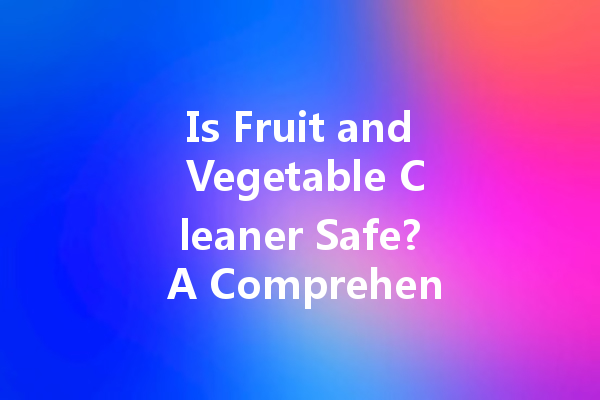In today’s world, food safety is of utmost importance. As consumers become increasingly aware of the pesticides and bacteria that may be present on the produce they buy, many are turning to fruit and vegetable cleaners for reassurance. But just how safe are these cleaners? In this article, we will explore the safety of fruit and vegetable cleaners, their effectiveness, and how to choose the right products for your needs.
Understanding Fruit and Vegetable Cleaners
Fruit and vegetable cleaners are specialized cleaning products designed to remove dirt, bacteria, pesticides, and wax from fresh produce. These cleaners often come in liquid or spray form and can be found in most grocery stores. While washing fruits and vegetables under running water is effective, some believe that using a dedicated cleaner offers an extra layer of protection.
The Safety of Ingredients
When searching for a fruit and vegetable cleaner, it’s crucial to examine the ingredients. Most cleaners include food-safe ingredients such as vinegar, baking soda, or citric acid. These natural components can effectively eliminate residue without leaving harmful chemicals behind. However, some commercial fruit and vegetable cleaners may contain synthetic additives or preservatives that could pose health risks if ingested. Always read labels to ensure the product is free from toxic substances.
Are They Effective?
Research suggests that fruit and vegetable cleaners can help remove certain contaminants more effectively than water alone. For instance, studies have shown that using a cleaner can reduce pesticide residues and some bacteria on the surface of produce. However, their effectiveness can vary from one product to another. Some cleaners claim to be particularly effective on certain types of contaminants, but it’s important to choose reputable brands and verify their claims.
Natural vs. Chemical Cleaners
Consumers often face a decision between natural and chemical-based fruit and vegetable cleaners. Natural cleaners, usually made from ingredients like vinegar and baking soda, are considered safer and environmentally friendly. On the other hand, synthetic cleaners may promise more aggressive results but could include harmful chemicals. Those who prioritize safety often prefer natural options, especially when cleaning items intended for raw consumption.
Proper Usage Instructions
To maximize the safety and effectiveness of fruit and vegetable cleaners, following the manufacturer’s instructions is crucial. Typically, you would rinse the produce under running water, apply the cleaner as directed, let it sit for a short period, and then rinse again to remove any remaining residue. It’s important not to skip the rinsing step, as this helps to wash away both the cleaner and any contaminants that have been loosened.
Considerations for Organic Produce
For those who buy organic fruits and vegetables, it’s essential to consider the use of cleaners. While organic produce often has fewer pesticide residues, it’s still wise to wash it to remove dirt and microorganisms. Many experts recommend using fruit and vegetable cleaners even on organic produce to ensure safety, as contaminants can occur at any point in the supply chain.
DIY Fruit and Vegetable Cleaners
For those who prefer a more hands-on approach, making a DIY cleaner can be a safe and economical option. Simple recipes often include vinegar diluted with water or a solution of baking soda and water. These homemade cleaners are effective for most surface contaminants and don’t contain any harmful chemicals. However, it’s important to note that DIY solutions may not be as potent against certain pesticides, so it’s essential to understand their limitations.
The Bottom Line
In conclusion, fruit and vegetable cleaners can be a safe and effective way to protect your family from potential contaminants on produce. It’s vital to choose products with safe ingredients, follow usage instructions, and consider the type of produce you’re cleaning, whether conventional or organic. While many consumers may feel reassured by using these cleaners, remember that proper washing techniques and awareness of what you’re buying will always be your best defense against foodborne illnesses.
As with any product, informed decisions will lead to the safest and healthiest outcomes. Always stay up to date on the latest research and recommendations regarding food safety practices. Knowing what you’re putting on your produce can ultimately contribute to your overall health and well-being.

